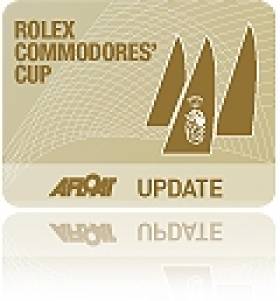Displaying items by tag: Irish Cruiser Racer
Ireland's 1978 Commodores' Cup Victory Remembered
As Irish sailing prepares to honour the team that brought the Commodores' Cup home after a ten year wait, the fact Ireland previously won the Cup 32 years ago will be news to many involved, wrote David O'Brien in last Friday's Irish Times Sailing Column.
It turns out a single Irish Team won the Cup in 1978 beating an English team, the only other entry that year. (See Jack Connor's note below).
What amounts to a lost chapter in the history of the cup reveals Ireland's long standing love affair with the top prize in cruiser-racing.
The 2010 achievement is being celebrated on November 13th at the Irish Cruiser Racer (ICRA) Conference in Cork and at a gala dinner in honour of the team at the Royal Cork Yacht Club in Crosshaven that same night.
After mounting multiple teams, considered favourites going into both the 2006 and 2008 events but failing to win either, the Royal Cork boats Antix, Marinerscove.ie and Roxy VI secured the Cup in August.
After first being jilted by the French and twice by the English, the Irish could be forgiven for giving up on the cup but we never did.
The win is the highlight of the sailing year and it is the centrepiece of an action packed conference that will reflect on a job well done, the same as in 1978.
Back then the Commodore's Cup was also staged in Cowes. It was hosted by The Royal Corinthian Yacht Club and sponsored by John Haig, Scotch Whisky.
Only two teams registered, Ireland and England, so it became a match racing event. The teams consisted of a One Tonner, a Three Quarter Tonner and a Half Tonner in the existing rating bands of the day.
The Irish team consisted of Jack Connor's Sheer Magic, from Carrickfergus, Poppy, a contention 33, on charter from John Deans to Pat Donovan and Silver Shamrock skippered by Harry Cudmore.
The English team consisted of Green Highlander, Samsara and Red Hot Granny.
Crew line-up included Cork sailmakers John and Des McWilliam and Dick Gibson.
The races consisted of three inshore races, one middle distance and the event culminated in a Channel Race, similar to today's event.
Skipper Jack Connor says "I remember all the details as the sponsor had put up a prize of a gallon bottle of whisky to the winner of each class for each race! We won two, I still have one of the bottles, but Harry and his crew of four others won every race, that's five one gallon bottles of Haig!
It's a seldom heard story that is certain to be applauded again in Cork next month and one that should renew efforts to bring the Cup home for a third time.
1978 Commodore's Cup Winner Jack Connor writes:
I have recently read of the success of our national team in the Commodore' Cup event, and I whole heartedly congratulate all involved. I do not wish to knock the wind out of any sails but I would point out that the Commodore's Cup was won by Ireland in 1978! The event was staged in Cowes, hosted by The Royal Corinthian Yacht Club and sponsored by John Haig, Scotch Whisky. Two teams registered, Ireland and England so it became a match racing event. The teams consisted of a One Tonner, a Three Quarter Tonner and a Half Tonner in the existing rating bands. the Irish team consisted of Sheer Magic,from Carrickfergus, my boat, Poppy,a contention 33, on charter from John(?) Deans to Pat Donovan and Silver Shamrock skippered by Harry Cudmore.
The English team consisted of Green Highlander, Tom Chadwick; Samsara, Odile Van Trom or Dom(I think); and Red Hot Granny, or Gonnagetcha. There was one French boat turned up at the marina, but it did not take part.
I remember all the details as the sponsor had put up a prize of a gallon bottle of whisky to the winner of each class for each race! We won two,i still have one of the bottles, but Harry and his crew of four others won every race! 5 one gallon bottles of Haig's!!!
Ireland won the event and we were presented with the Commodore's Cop trophy, a Gold Cup which had been donated by two well known sailors of the time (I do forget their names- sorry).I believe it is the same trophy.
The races consisted of three inshore races, one middle distance and culminated in the Channel Race. We had enlisted the help of John McWilliam and Dick Gibson from the McWilliam sail loft as crew and I recall Des joined us for the Channel Race.It was hard to get time off work in those days.
It was our first time in the "Big League" of sailing and we enjoyed every minute of it.My memory of those times is still pretty good if anyone wants more information.
(there is an interesting story attached to Sheer Magic if anyone is interested.) Regards Jack Connor.
























































